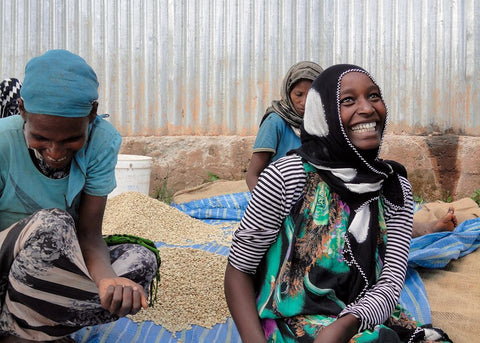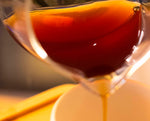Ethiopia is often referred to as the birthplace of coffee. Plants have never been cross-bred and grow wild in pristine forest. This makes them strong and disease resistant - which means coffee from Ethiopia is not only delicious, but also 100% organic. The growing regions in Ethiopia probably sound familiar, as they are some of the most recognisable names in coffee. Yirgacheffe, Sidama, and Limu are all world-renowned for their incredible aromatic coffees. In 2004 the Ethiopian government trademarked the three regions in an attempt to narrow the disparity between the price producers receive for their coffee, and the retail price of the same roasted coffee. Although these are the most well-known regions, the diversity of flavours that come from Ethiopian varietals means other regions like Jima, Ghimbi/Lekempti, and Harrar should definitely not be overlooked.


OUR EXCLUSIVE FARM RELATIONSHIPS
Previously, only farms larger than 30 hectares were allowed to export directly, but a recent law change has allowed for more direct trade with smallholders. 95% of coffee in Ethiopia is grown by smallholders, so this change is a great step towards empowering those producers while vastly improving traceability. Our Ethiopian season this year will see a return of 3 fantastic coffees that we buy exclusively in mainland Europe: Mohamed Ali, Dambi Uddo, and Edido. Engaging on an exclusive level enables us to build a very close relationship with our farmers.
For instance, in the case of Mohamed Ali, this means that he can fully rely on one partner, he knows exactly that we are buying and at what price (never lower than the year before). That helps Mohamed taking decisions that require an upfront investment in pickers, drying tables, sorting and processing in general. By bringing those things to a higher level, Mohamed was able to bring the production output of Grade 1 coffees up from 20% to 60% this year. This is real money for Mohamed. We are also now able to pay directly into sustainability projects at farm level. The exchange between Mohamed and us increases and we both understand much better what each of us needs. Our local partner and exporter, Belco, are supporting Mohamed just as much. With agronomy training, pre-finance, seedlings, soil anaylsis and real help in farming throughout each season. Belco also paid the license fee for being certified organic for Mohamed. Not that we require this, but Mohamed felt that this would increase his attention to detail in processing - plus his standing in the local community. At our end, exclusivity means that THE BARN is able to offer coffees that are unique to our portfolio. It also allows us to have a greater impact and work on special processing (for instance: honeys or maceration). Together with our coffee growers we can push quality levels and really have an impact on a meaningful change at source.


DAMBI UDDO ESPRESSO
Dambi Uddo is owned by Wodessa Yachisi, who is currently building a new drying station with 120 new drying beds. The compound also includes housing for workers and visitors. When we visited him last year, we had one of the best lunches ever with ingredients coming from the surrounding forests. Most coffees processed at Dambi Uddo are naturals. They dry for 21 days in half shade, then rest in parchment for 45 days, before being sent to the dry mill for husking, screening, and cleaning. The sorting is extremely thorough and includes optical sorting to ensure that only the finest qualities will be used for THE BARN.
Wodessa ensures that the village around Dambi Uddo benefits from the success of the farm. He has contributed towards the construction of two schools and a new 8km gravel road – if you have ever visited Ethiopia you will understand how necessary the building of these roads is. Wodessa hires around 300 pickers at peak harvest, pays above average wages, and offers fresh water and lunch while they work. There is no child labour, equal rights for all, and the opportunity for training in economic, social, and sustainability issues. Dambi Uddo functions sustainably by paying high wages and offering benefits like health insurance, food, housing, and clothing to encourage experienced pickers to return each season. Dambi Uddo is a very unique coffee with intense flavours: strawberries, bergamot, pineapple and guava are all predominant. In milk the espresso brings out tropical and black tea notes. This coffee has a jammy mouthfeel. Scoring: 89 points.


MOHAMED ALI
This year will see the return of our natural processed beans, and for the first time, a honey lot from our exclusive partnership with Mohamed Ali. The farm has two sites, one called Boto and the other Gera. Both produce gorgeous coffees, which is one of the reasons we are so excited to continue our work with this producer. Both sites of Mohamed Ali are located in wild jungle, with wildlife and nature at its purest. The coffees are half shade-grown and fully organic. With the support of our local partner, Belco, the farm is in the process of being certified organic. Harvest is from November – January, with five rounds of picking. Gera site is not easy to reach. We have taken motorcyles on our visit last year. Once coffees are dried and ready for the dry mill, they are transported back to the road by horses. The rain stopped early in Ethiopia last year, however Mohamed Ali`s micro-climates were blessed with good rain and produced good amounts this season.
Last year, Mohamed Ali only produced very little of the desirable grade one coffees. The main reason was wrong picking which was related to the fact that Mohamed Ali had no partner and visibility on pricing. He was therefore unable to afford several rounds of picking. After THE BARN committed to buy from him at a high price, Mohamed was able to invest in better picking and processing. As a result, he produced 60% of grade ones this season which is a huge jump for a farm. Naturals dry for around 18 to 25 days. Honeys need only 10 to 14 days, which is why Mohamed Ali starting producing honeys. They also taste delicious! The coffees stay in parchment for 30-45 days, after which they are sent to be cleaned at the dry mill. Both site purchased a de-huller to produce honeys. They also added drying beds and a new warehouse on-site that can store up to 1500 bags of parchment.


Mustafa was brought up in Boto village and took over the farm from his father Mohamed in 2000, who had started the farm 60 years earlier. Mustafa now runs the farm with the help of his brother, but was waiting for a partner like us to be able to expand and improve. Our export partner Belco is also able to offer him financing and loans so he has working capital, and with our exclusive relationship he can calculate how much he will earn over the season and plan accordingly. At THE BARN we promise never to pay less then the previous year - if quality goes up we increase our pricing. Because of this support he has been able to begin massive upgrades on the farm to improve quality even more in coming seasons. Keep your eyes peeled for the Mohamed Ali honey and natural – the honey is due to be released for filter at the end of May, and the natural for espresso around September. In the mean time, we feature Edido and the Dambi Uddo that have already been released. Both were roasted for espresso, but also taste absolutely delicious as a filter thanks to their intense flavour notes and our light roast style.
Ethiopian coffees make for a great summer cup, and this is one of the first two that have already been released this season. Edido only produces one container of washed exportable grade one per year. This coffee is exclusively ours for mainland Europe. Edido is the village where this coffee is grown and processed, in a micro-region of Yirgacheffe, Aricha, which is about 8 km from the centre of Yirgacheffe Town. The coffee is picked ripe between November and January, depulped within 12 hours, and washed clean with spring water. The soils in this region are red-brown clay soil, about 1.5 meters deep. Edido is a sweet, floral coffee with low acidity. It has tons of flavours ranging from sweet nectarine, honey suckle, jasmine, black tea and milk chocolate. The silky body and a lovely acidity balance out the taste experience of this cup. We roasted Edido for espresso, but it also tastes incredible as a filter brew. Edido is our main washed espresso from Ethiopia this season.












